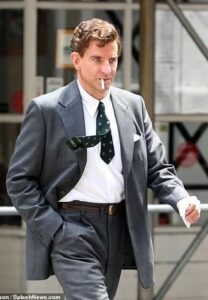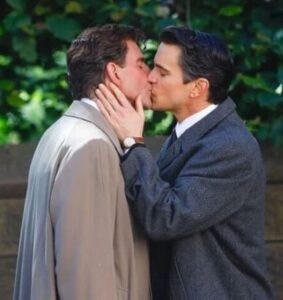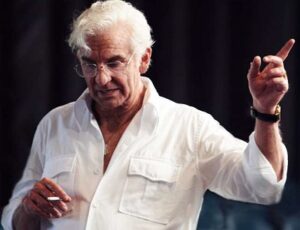Maestro
 There’s a scene late in Bradley Cooper’s new Leonard Bernstein biopic “Maestro” in which the renowned music legend is guest teaching a college-level conducting course. He stops a young student conductor and shows him how to work his way through a complicated sequence involving a fermata, followed by establishing a new tempo for the next section. Once the student takes Bernstein’s advice, the musical progression finally flows smoothly. It is here where we see Bernstein’s musical genius at work. I only wish Cooper had incorporated more of these scenes of the “inner workings” of music. We don’t need to understand every term or nuance; but we need to understand that Bernstein knows what he’s talking about.
There’s a scene late in Bradley Cooper’s new Leonard Bernstein biopic “Maestro” in which the renowned music legend is guest teaching a college-level conducting course. He stops a young student conductor and shows him how to work his way through a complicated sequence involving a fermata, followed by establishing a new tempo for the next section. Once the student takes Bernstein’s advice, the musical progression finally flows smoothly. It is here where we see Bernstein’s musical genius at work. I only wish Cooper had incorporated more of these scenes of the “inner workings” of music. We don’t need to understand every term or nuance; but we need to understand that Bernstein knows what he’s talking about.
Common biopic trap
Instead, “Maestro” falls into the relatively common trap of presenting us with a laundry list of Bernstein’s life without ever showing us what made him so accomplished. Cooper and Josh Singer’s screenplay begins as the young understudy is called in at the last minute to conduct a performance of the New York Philharmonic when principal conductor Bruno Walter falls ill. Bernstein’s dynamic performance and energetic conducting earn him widespread praise amongst the classical music community. To quote Cooper’s last directorial effort, it is at this point that “a star is born.” Although Cooper mercifully spares us time-setting titles, Bernstein’s debut occurs in 1943.
Brilliant black & white
The ensuing hour of the film – the 1940s and ‘50s portion – is shot in brilliant black and white by cinematographer Matthew Libatique (Darren Aronofsky’s primary cinematographer). And by brilliant, I don’t mean simply choosing to film these years in black and white because most motion pictures and all television were shot in black and white in those days. I mean brilliant because Cooper and Libatique use black and white to accentuate the look and feel of the time period. When the bright stage lights illuminate a stage, the effect is magnified without the distraction of color. In black and white, we don’t just see Bernstein perform under the lights; we feel him perform.
Excellent performance
Of course, Cooper deserves as much credit for his execution of Bernstein’s character as he does for his cinematic choices. While the make-up department’s achievement is fantastic, Cooper so immerses himself in Bernstein’s character that we’re not even aware we’re watching Cooper – the way we were constantly aware we were watching Anthony Hopkins portraying Richard Nixon in Oliver Stone’s “Nixon.” And Cooper’s performance is not just a Rich Little impersonation. The accent and mannerisms are spot-on, but Cooper captures the heart and soul of the man the way few have been able to do in film biographies.
But “Maestro” is as much about Bernstein’s wife Felicia as it is him. As James Marsh did in his Stephen Hawking biography “The Theory of Everything,” Cooper and Singer choose to allow us to experience Bernstein’s brilliance through the filter of his wife and life partner. It’s as though there’s simply too much to comprehend without a narrative guide, and the Felicia character is utilized in this fashion. Stepping up to the plate here is British actress Carey Mulligan, who actually receives top billing over Cooper. This is every bit as much her story as it is his.
 Felicia
Felicia
We know from the outset that Bernstein is gay. And he continues to take much younger gay lovers even late in his life. Felicia is aware of this, but falls for him anyway. They marry and raise a family together. And even following her 1978 death to cancer, Bernstein never misses a chance to openly declare his love for her.
The actor
There’s an excellent early dating scene where Felicia, a budding actress, invites young Leonard to help her practice her lines for an upcoming stage play. While Felicia is obviously well trained in the theatre, Bernstein’s loud, overpronounced reading is almost comically bad. He confides that acting is just not his forte. How wrong this assessment turns out to be! Every time we see Bernstein conduct an orchestra or choir, his bodily gyrations draw the audience into the musical performance in a way “standard” (or more “serious”) conductors simply cannot. Bernstein is acting every time he takes the stage. And that’s why he was so beloved. He brought new fans to classical music through his public on-stage reaction to it.
Accessibility
“Maestro” does an excellent job of showing us Bernstein’s accessibility – on stage and off. He was never one to turn down an interview; and boy did he know how to work a crowd. I do wish Cooper and Singer had given us a little more background. We are given no scenes of Bernstein’s childhood. And save for a verbal reference to his abusive father, we know nothing of his upbringing. Perhaps such inclusion could have helped us know more about the adult Bernstein we experience for just over two hours. Some of the middle scenes could be cut. As with many biopics, we simply meet too many people during the course of “Maestro.” Characters are introduced to Bernstein, and then never reappear later in the script.
Musicals
Furthermore, mention is made of the Broadway musicals Bernstein composed, but we never have the chance to experience them during the course of “Maestro.” I realize this is a biography film, not a series of performances. But “West Side Story” redefined the musical genre for newer and younger audiences like no other production. We hear Leonard, Felicia, and others discuss its success, but we need to experience its greatness to help flesh out the character. Unfortunately, such performance scenes are absent from the screenplay.
 Good, but incomplete
Good, but incomplete
There’s a lot to like in “Maestro,” but there’s a lot of conspicuously missing material too. For such an influential figure, it’s next to impossible to do justice to his life in one two-hour film. “Maestro” is a valiant effort, and I do recommend seeing it. But my recommendation comes with the caveat that it will leave you wanting for more. I contrast “Maestro” to Martin Scorsese’s “Raging Bull,” which told us everything we need to know about Jake LaMotta – granted, a far less well-known character than Leonard Bernstein. “Raging Bull” was as complete a biography as has ever been put to celluloid. “Maestro” is not.
Andy Ray‘s reviews also appear on https://townepost.com/.